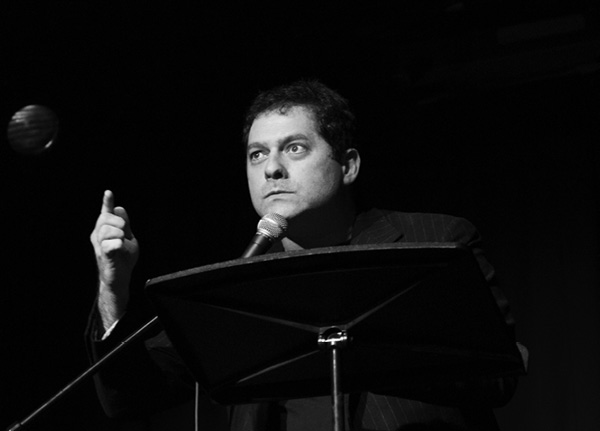
GGPS: THE GUILLERMO GÓMEZ-PEÑA GLOBAL POSITIONING SYSTEM
first performed on June 22, 2014
Sala Rossa, Montreal, Canada
performed once in 2014
L.M. BOGAD
Guillermo Gomez-Pena
Berkeley, CA / San Francisco, CA
703591838l703591838m703591838b703591838o703591838g703591838a703591838d703591838@703591838g703591838m703591838a703591838i703591838l703591838.703591838c703591838o703591838m
lmbogad.com
GGPS: THE GUILLERMO GÓMEZ-PEÑA GLOBAL POSITIONING SYSTEM
L.M. BOGAD
GGPS: THE GUILLERMO GóMEZ-PEñA GLOBAL POSITIONING SYSTEM
I am alone, directionless and disoriented. I turn on my “GPS” system. The recorded voice of my colleague Guillermo Gómez-Peña (known as GGP) booms in the darkness. At first I just use the “GGP-GPS” to move through space geographically, but quickly the directions become existential, absurd, embarrassing. The GGPS system and I argue hotly, ludicrously—in Nahuatl, Basque, and gringoñol—about choosing ethical directions as artist-activists, body fascism, our contrasting aesthetics and borders of privilege.
It is strange, creating a performance in which you are writing rather harsh lines with which a treasured friend mocks, provokes and berates you. But this is the relationship that I have with Guillermo Gómez-Peña. We smile and jest at each other across porous, fluid, but substantial and significant borders of identity, ethnicity, sensibility, privilege and profession. In our rehearsal process Gómez-Peña adapted and improvised his lines so that they were sharper, stronger, and fit his style.
GGP and I both played cartoonish versions of ourselves; he using a mock-robo-chicano voice and I as a haughty academic with pretensions of egalitarianism. But soon enough the unseen “robot” is subverting and overturning the power relationship—misdirecting me so I miss a faculty meeting and lose my job (to provide a slot, finally for a scholar of color in my ossified department), pushing me to Mexercise™ onstage while quoting Marx in Esperanto, sending me on confrontational missions out into the audience—to exchange bodily fluids, confessions, or legally-binding pledges of solidarity. It is darkly fun to use the premise of El Maestro GGP’s “commands,” which I have written, to push myself.
Gómez-Peña’s directives become more challenging and ridiculous. I fight back. Our differences in agenda and style become starker. However, as we approach a border checkpoint that must be crossed, we reach a synthesis or at least a syncretic truce, in tentative coalition if not in alliance.
Meanwhile, the unfolding performance is a provocation I deliver to myself—a chance to raise the personal stakes in my own aesthetic, to take more personal risk, not just physically on the street but emotionally in terms of self-exposure, and ethical self-critique and implication. Inspired by GGP’s actual lived example, and prodded by this cyborg-fabulous version of him, I intend to cross this border. The piece avoids, I hope, narcissism or solipsism as it uses the “vehicle” of the GGPS to engage with larger issues of racism, scholarship, and dissent.